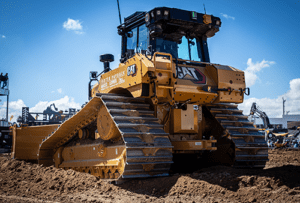Finding and getting a replacement part for a piece of construction equipment is not always easy, even in today’s digital world. But Gearflow, a fledgling construction industry online marketplace, is gaining traction as a portal offering products ranging from backhoe and crane equipment to hydraulics and engine components from dozens of suppliers.
Launched in 2018, Gearflow is processing more than half of its online orders from repeat buyers, and in the third quarter of this year more than doubled its number of new customers, CEO Luke Powers says. (Powers will speak on B2B marketplaces during the June 17 online event, Breaking the Barriers to B2B Ecommerce Success, hosted by Digital Commerce 360.)

Luke Powers, CEO, Gearflow.com
Powers co-founded Gearflow with Ben Preston, the company’s chief marketing officer, to fill what they figured was a major void in the business of selling construction equipment parts. Many manufacturers and parts dealers don’t have an online presence, and if they do, their websites lack many of the ecommerce features buyers expect, such as real-time inventory counts, projected delivery dates and even the ability to purchase a part online.
But real-time inventory counts and projected delivery dates are crucial for construction companies because the cost of an idle piece of equipment at a job site can cost contractors about $350 an hour, according to ConstructionEquipment.com, an information source for the construction industry.

Ben Preston, chief marketing officer, Gearflow.com
Moreover, many suppliers of construction equipment parts, especially aftermarket suppliers, are unknown to many construction companies. Outside of construction industry trade shows, it is difficult for construction companies to research and procure the best value on parts, tools and equipment, industry experts say.
Seeing the need to bridge the ecommerce gap for construction equipment parts, Powers and Preston launched Gearflow as a marketplace that brings construction equipment parts suppliers and buyers together in one place. The two-year-old site serves as a destination for construction companies to find sellers and research their shipping, return, and warranty policies. Gearflow hosts more than 70 online stores for such suppliers as Aerial Specialists, Abbasi Equipment, Blue Diamond Attachments, and Genie Industries.

A Caterpillar bulldozer image from Gearflow.com
“Ecommerce is scarce in the construction equipment parts business,” Powers says. He asserts that product-listing sites, brokers, and such general marketplaces as eBay.com and Amazon.com do not really meet the needs of contractors when it comes to buying replacement parts online. And unlike Amazon, Gearflow does not sell products and compete with the third-party sellers on its marketplace.
“Contractors need to be able to find parts to maintain their fleet of equipment from trusted suppliers, but the parts market is so fragmented that it is hard to see all the available suppliers without a marketplace,” he says. “We see Gearflow as a platform that enables the outsourcing of parts management for contractors.”
Each supplier on Gearflow has its own online storefront and landing page. They also work with a website specialist assigned by Gearflow to help build out product pages. There is no limit to the size of a supplier’s catalog on the marketplace, and Gearflow charges no listing fees.
Suppliers can upload their catalog using a CSV (comma-separated values) file, a delimited text file that lists all pertinent product information, such as the product name or title, description, price, specifications, and available quantities, plus an image of the item. Gearflow also provides an application programming interface (API) that connects a supplier’s ERP system to the online marketplace platform..
In addition to product information, suppliers provide to Gearflow their own shipping policies, such as the cut-off time for same-day orders and their return/warranty policies. That information is available on each supplier’s storefront page and product pages. Currently, Gearflow has more than 1 million SKUs live on its marketplace, about 95% of which are parts.
Buyers can make a purchase using a credit card. Suppliers are charged card fee of 2.9% of the purchase price and a 9.75% commission for orders below $5,000. Gearflow waives commissions for purchases of more than $5,000. The average order value on the marketplace is between $800 and $900, Powers says. Transaction processing is provided by Stripe, which offers payment processing and APIs for e-commerce websites and mobile applications. Sales made outside the United States and Canada require a wire transfer to complete the purchase. Gearflow also collects sales tax at checkout and remits the tax back to the appropriate state on behalf of the supplier.
Gearflow has been so popular with suppliers and buyers since its launch, Powers says, that the company redesigned the site and relaunched it in April. “With the number of SKUs we were adding and the demand for adding more, we basically outgrew the site,” he says. “We rebuilt the site from the ground up so it can handle tens of millions of SKUs.”
About 50% of Gearflow’s sales are initiated offline because many customers prefer to call in orders, Powers says. But 50% of orders processed through the marketplace between January and November have come from repeat buyers. In addition, the number of new customers increased by 140% during the third quarter of 2020 compared with the second quarter of this year. Return rates are less than 2% of sales, which Powers attributes to the information Gearflow provides buyers to help them find the right part.
To help ensure that contractors get the part they need fast, Gearflow provides next-day delivery or second-day air shipping. Ground shipping rates are automatically charged at checkout so contractors know the cost upfront.
“It’s our job to provide a transparent platform for our suppliers to grow their businesses,” says Powers. “Platforms such as Hotels.com and Expedia.com have provided seamless, transparent transactions for decades without owning any competing services, and that’s how we see the future of the construction equipment industry. A contractor should be able to log onto Gearflow and see what they can pick up today locally or have shipped in tomorrow from a network of vetted suppliers.”
Last fall, Gearflow.com said it raised $1.1 million in a seed round of funding from investors including Thomas H. Lee Partners, Annabelle LLC, and Chicago Early Growth Ventures.
Peter Lucas is a Highland Park, Illinois-based freelance journalist covering business and technology.
Sign up for a complimentary subscription to Digital Commerce 360 B2B News, published 4x/week, covering technology and business trends in the growing B2B ecommerce industry. Contact editor Paul Demery at [email protected] and follow him on Twitter @pdemery.
Follow us on LinkedIn and be the first to know when new Digital Commerce 360 B2B News content is published.
Favorite